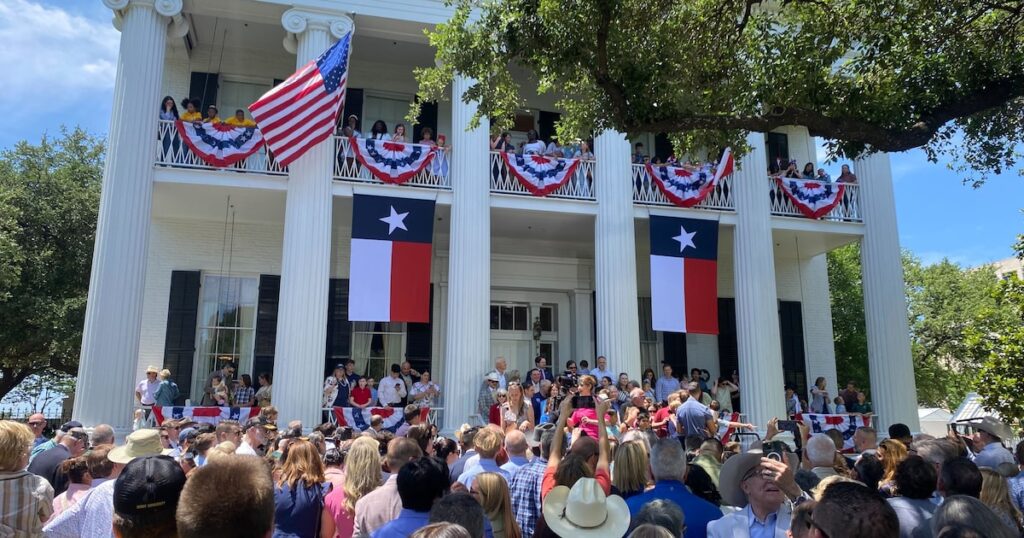Texas families will be able to access public money to pay for private school through a new school choice program.
Gov. Greg Abbott on Saturday signed into law an education savings account program with near-universal eligibility — positioning the state to potentially have the largest school choice program in the nation soon.
Hundreds gathered outside the Texas Governor’s Mansion celebrating the historic milestone in education for the state. The student band from Cornerstone Christian Academy in San Antonio played for the families, lawmakers and others gathered.
“Today is a culmination of a movement that has swept across our state and our country,” Abbott told the cheering crowd.
The ceremony caps a decadeslong fight led by some Republican state leaders to bring a school voucherlike option to Texas. They say the ESA plan gives parents a financial lift out of the public campuses that don‘t fit their children‘s needs.
Related:What to know about the new school voucher-style plan for Texas
Abbott, flanked by the high-ranking Republicans in the Legislature who helped deliver what has been a campaign promise since 2022, said the new law puts Texas on a trajectory to become the highest-ranked education system in the country.
“Gone are the days that families are limited to only the schools designed by government,” he said. “The day has arrived that empowers parents to choose the school that is best for their child.”
Lt. Gov. Dan Patrick said the signing was “a day the Lord made.” Patrick has fought to pass a school voucherlike program in Texas for more than a decade.
“It took a long time to get to the river, but we have crossed the river today because of all of you — your presistence of not giving up on the American dream for your child and other children,” he said.
For opponents, the bill signing signaled a devastating shift in the Texas education landscape.
They fear the program will funnel money and resources away from the public schools that serve the vast majority of the state’s children. Critics note that private schools don‘t have to accept all students and aren‘t subject to the same academic accountability standards that neighborhood campuses are.
State Rep. James Talarico, D—Round Rock, said in a statement, “Remember this day the next time a school closes in your neighborhood. Remember this day the next time a teacher quits because they haven‘t gotten a pay raise. Remember this day the next time your local property taxes go up because the state is not doing its fair share of school funding.”
The new law, created by Senate Bill 2, allows parents to apply for an ESA to pay for private school costs, such as tuition, uniforms, meals and other educational materials. They are expected to be available beginning in the 2026-27 school year.
The ESA will be worth 85% of the per-student funding that public schools receive from the state and in local tax revenue. That would equal about $10,330 in 2027 and rise to roughly $10,900 by 2030, according to state budget board projections.
Children with disabilities are eligible for additional money — up to $30,000 per year — while homeschooling families could access $2,000.
If demand for the program exceeds available funds, the money will be handed out via a lottery with low-income families and students with disabilities prioritized.
The programs’ budget is capped at $1 billion through 2027, but the budget board estimates its costs could exceed $4 billion a year in 2030.
“The ultimate cost of the ESA program would be limited to the amount appropriated by the Legislature,” the fiscal note reads.
The board’s projection assumes 24,500 students would leave public schools for private schools in 2027, increasing to nearly 100,000 by 2030. Because public schools are funded based on how many students attend, these departures could strain districts’ already-tight budgets.
The creation of the ESA program signals a major shift in Texas politics. For years, a band of rural Republicans joined with House Democrats to block similar programs. They were united in their concern about how an ESA program would impact public schools, which often represent a major employer and community center.
In many places, private schools are inaccessible to families both because of distance and cost.
The coalition of rural Republicans and Democrats held back repeated attempts to pass school voucherlike legislation. In 2023, Abbott demanded a bill. He called lawmakers back to Austin multiple times for special sessions to pass a plan.
When it failed in November 2023, Abbott torpedoed billions in school funding that many districts blame for school closures.
“As we struggled in the Texas House to get this done over the years, there are times, I’ll tell you, I began to wonder if it’s ever going to happen,” said Rep. Brad Buckley, the Salado Republican who carried the bill in the House.
Abbott spent millions of dollars last year campaigning to replace many of those GOP “no” votes after his plan failed in 2023. The dramatic infusion of money and political pressure — including support from President Donald Trump — proved successful.
Ultimately, only two House Republicans voted against SB 2.
This is a developing story and will be updated frequently.
The DMN Education Lab deepens the coverage and conversation about urgent education issues critical to the future of North Texas.
The DMN Education Lab is a community-funded journalism initiative, with support from Bobby and Lottye Lyle, Communities Foundation of Texas, The Dallas Foundation, Dallas Regional Chamber, Deedie Rose, Garrett and Cecilia Boone, Judy and Jim Gibbs, The Meadows Foundation, The Murrell Foundation, Ron and Phyllis Steinhart, Solutions Journalism Network, Southern Methodist University, Sydney Smith Hicks, and the University of Texas at Dallas. The Dallas Morning News retains full editorial control of the Education Lab’s journalism.


